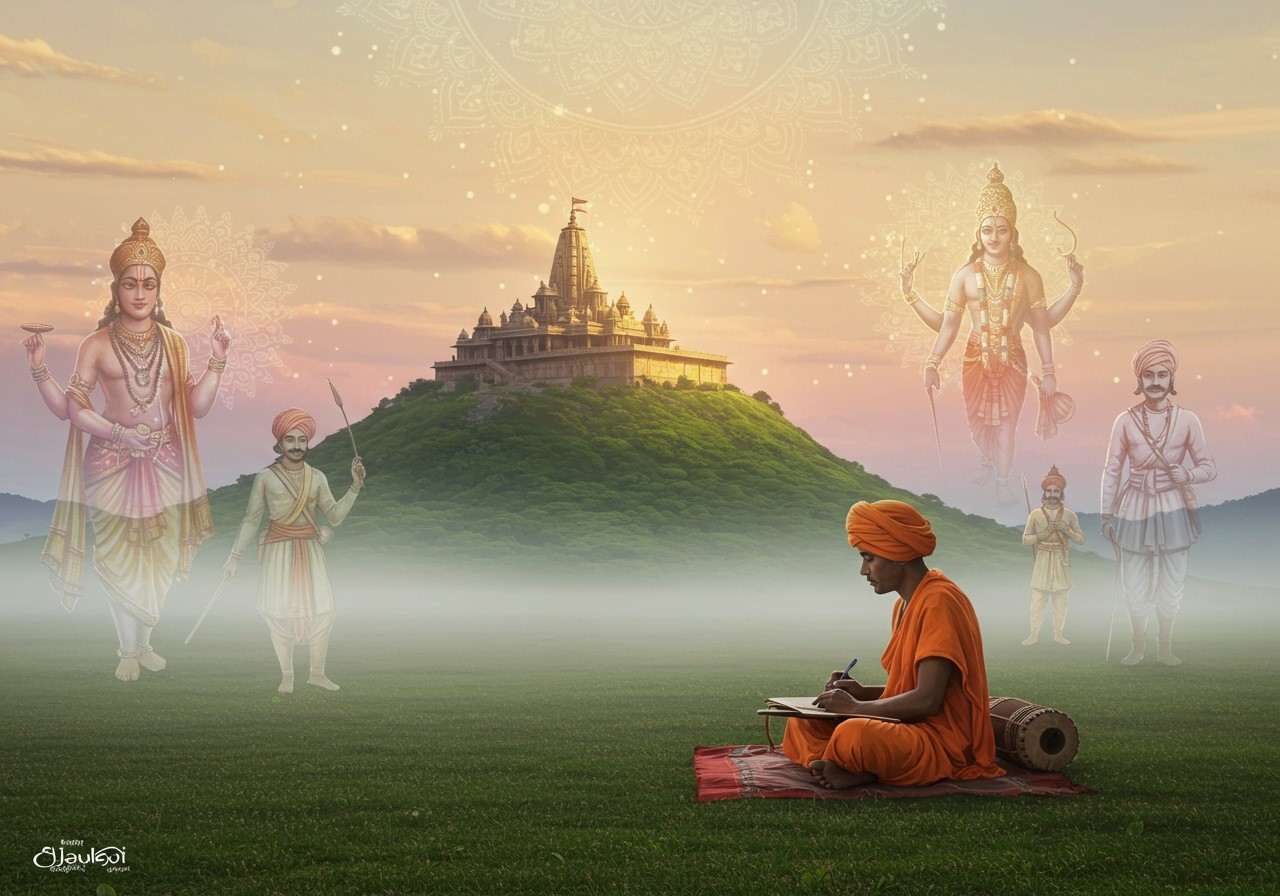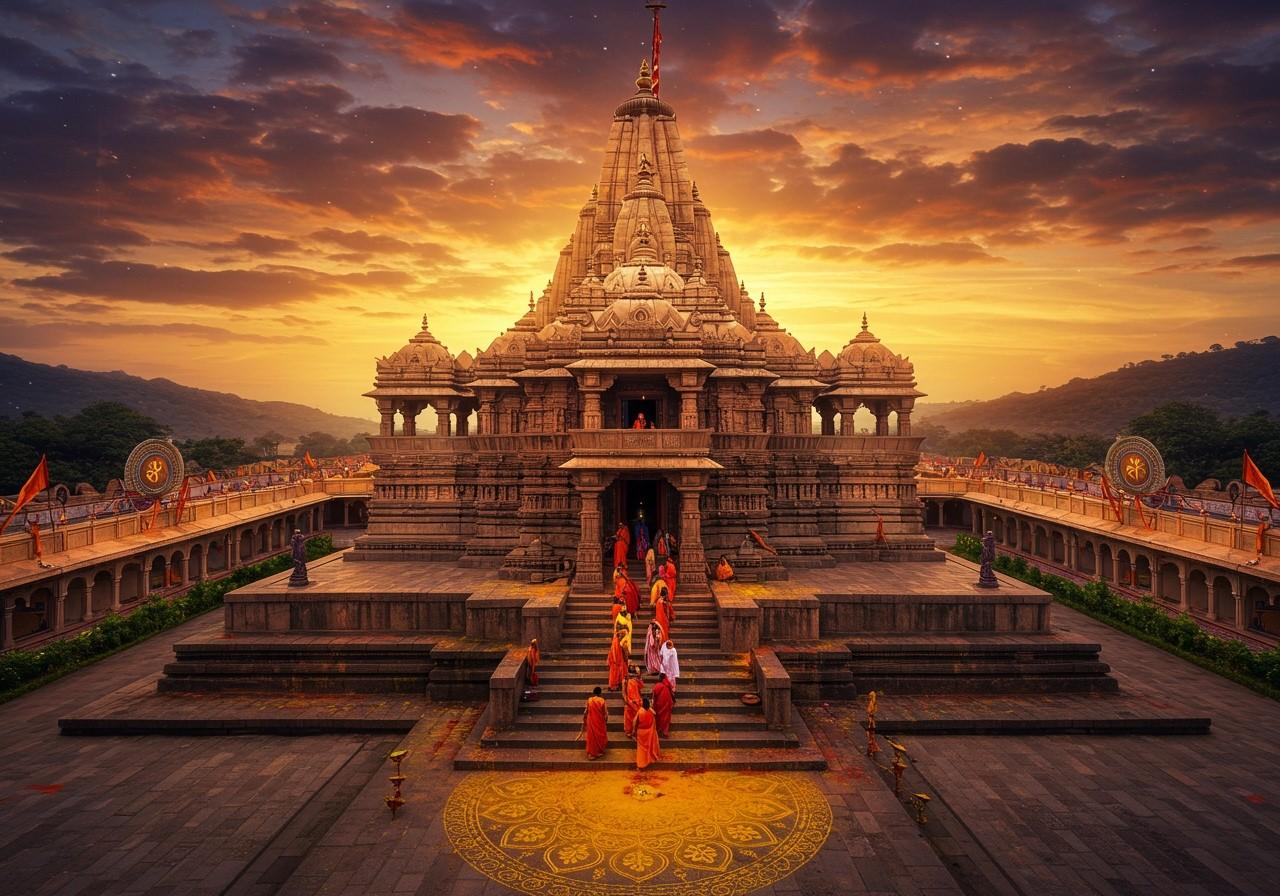
Have you ever been on a pilgrimage? Not just the travel, but the feeling inside—a mix of excitement, devotion, and a little bit of curiosity. Arun Kolatkar’s famous poem, “Jejuri,” is exactly that feeling captured in words. It’s more than just a poem; it’s like taking a walk through the holy town of Jejuri in Maharashtra, seeing it through the eyes of someone who is both a devotee and a curious observer.
This isn’t just a literary masterpiece; it’s a heartfelt look into what faith means in modern India, making it a journey every culturally rooted Indian can connect with.

What Makes Jejuri So Special?
Before we dive into the poem, let’s talk about Jejuri itself. Nestled in Maharashtra, this town is famous for its temple dedicated to Lord Khandoba, who many consider an incarnation of Lord Shiva. For centuries, this sacred place has drawn pilgrims from all walks of life. The air in Jejuri is thick with devotion, the scent of turmeric (bhandara), and the sounds of ancient chants. It’s a place where history, myth, and faith live and breathe together. The poem captures this very essence, exploring the rituals and deep-seated beliefs that make Jejuri a spiritual powerhouse.
If you’re planning a visit, our practical guide to a Khandoba temple trip can help you prepare for this divine experience.
Seeing Through Arun Kolatkar’s Eyes
So, who was the gifted writer who painted this vivid picture of Jejuri for us? Arun Kolatkar was a brilliant poet who had a unique way of looking at the world. He saw the extraordinary in the ordinary. In “Jejuri,” he doesn’t just describe the grand temple or the main deity. Instead, he finds divinity in a simple stone, questions the meaning behind a ritual, and observes the humanity of the priests and pilgrims around him.
His writing feels honest and real. He doesn’t give us straightforward answers about God. Instead, he explores the beautiful, messy, and sometimes confusing relationship between faith and doubt. He notices how tradition and modernity exist side-by-side, sometimes clashing, sometimes blending perfectly. This makes the poem feel less like a sermon and more like a conversation with a wise friend.
The Deeper Meanings Woven into “Jejuri”
As you read Kolatkar’s verses, you begin to see that the poem is about so much more than just one town. It holds up a mirror to our own society and our spiritual lives.
- Finding God Everywhere: Kolatkar suggests that divinity isn’t just locked away inside an idol. It’s in the crumbling stones of the temple, the faith of an old woman, and the everyday life of the town. He encourages us to open our eyes and find the sacred in the world around us.
- A Gentle Look at Modern Faith: The poem touches upon how pilgrimage sites have changed over time. It gently questions the commercialisation of religion, a thought that many of us have had. It explores the tension between pure devotion and the business that sometimes surrounds it, making us think about what truly matters in our spiritual practices.
- The Human Story: At its heart, “Jejuri” is a deeply human poem. It talks about poverty, social structures, and the simple hopes of ordinary people. It gives a voice to everyone, from the main priest to the forgotten outcast, reminding us that every story is important in the grand tapestry of faith. For a complete overview, you can check our complete guide to darshan at the Khandoba Temple.
Bringing the Spirit of Jejuri Home
Reading about such a powerful place often inspires us to deepen our own spiritual practices at home. The rituals and devotion described in Jejuri remind us of the importance of connecting with our traditions. Whether it’s a daily morning prayer or a special festival pooja, having the right items can make the experience feel more complete and authentic.
This is where we at poojn.in can help. We believe that everyone should have access to high-quality, authentic pooja items to honour their faith. To bring that sacred feeling into your home, you can explore our wide range of Pooja Samagri. From pure clay diyas to beautifully crafted idols, we provide everything you need to create your own sacred space. For those who find solace in reading, our collection of holy books can further enrich your spiritual journey.
Your Questions on “Jejuri,” Answered
Many people often wonder if they can actually visit the places mentioned in the poem. The answer is a resounding yes! Jejuri is a real, vibrant town in Maharashtra, and the Khandoba temple welcomes devotees every single day. A trip there allows you to walk the same paths Kolatkar did and experience the living culture he described so beautifully.
Another common thought is about the poem’s main theme. Is it about faith or doubt? The beauty of “Jejuri” is that it’s about both. It honours the deep faith of the pilgrims while also leaving space for questions. It reflects the modern Indian mind, which is deeply rooted in tradition yet curious and rational. It’s this balance that makes the poem timeless and relatable to so many of us.
A Journey That Stays With You
Arun Kolatkar’s “Jejuri” is not just a poem you read; it’s an experience you live. It’s a quiet reminder that a spiritual journey is personal and unique to each of us. It encourages us to look closer, question more deeply, and find our own meaning in the rich traditions that have been passed down through generations.
Whether you are a devout follower, a lover of literature, or someone simply curious about India’s cultural soul, “Jejuri” has something profound to offer. It’s a timeless classic that continues to inspire and make us reflect on our own path of faith.


